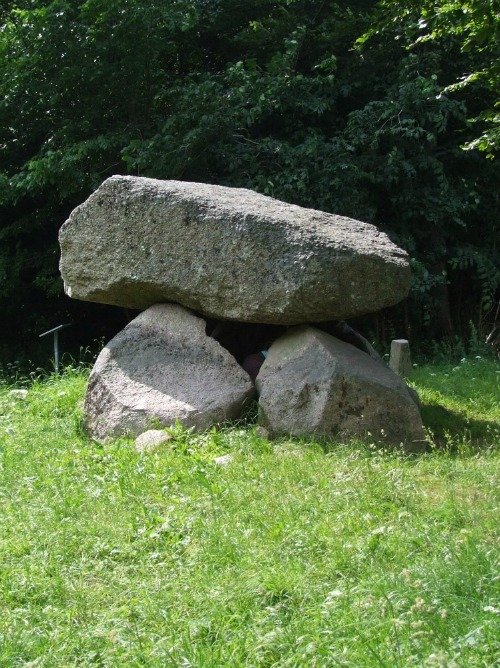Are You A Highly Sensitive Person, or HSP?
Are YOU a "Highly Sensitive Person," or HSP?
You may not think so, but there's actually a 1-in-5 chance that you are.
Before you start saying "ME??? NO way!" and launching protests, I should start by explaining that this isn't "sensitivity" in the way most people think about it... we're not necessarily talking about someone who gets their feelings hurt easily, or is a "delicate fragile flower," or one of those "liberal snowflakes who needs a crying room everytime they encounter something they don't like."

Hard as stone, yet delicately balanced
What does "Highly Sensitive" really MEAN?
Like many other aspects of life, the concept of someone being "highly sensitive" also has numerous meanings.
To some, it means a person who is high maintenance and aforesaid "delicate snowflake."
To some, it means a person with a fragile constitution who's allergic to everything.
To some, it means a person who claims to possess some kind of extrasensory gifts-- they can "see ghosts" or "sense things."
To some, it means a person whose natural degree of empathy is almost debilitating
Those are all valid interpretations in their own right, but that's really not what I am talking about here. I am talking about being Highly Sensitive as a result of Sensory-Processing Sensitivity... a natural (and neutral) nervous system condition that occurs in about 15-20% of the population.
Does any of the following sound familiar?
Have people ever told you that you're always "taking things too seriously?" And that you're too "fussy" or "particular?" Do crowds, loud events, bright lights or strong smells overwhelm and tire you out you easily? Do you usually want to spend time alone, after social events? Do you tend to startle easily? Have people told you that you're naive, gullible or "too idealistic?" Even if you love people, does social interaction exhaust you? Do you perform poorly, if people are watching or evaluating you? Are you uncommonly sensitive to medications and/or pain, even if you're otherwise a badass? Is your natural way to be more "cooperative" than "competitive?" Do you tend to be shaken up and rattled by surprises and sudden changes? Do you tend to be aware of the moods of others around you? Have people even told you that you are psychic? Are you highly attracted to the arts, music, theater and other creative fields? Does drinking coffee seem to affect you more than most people?
If you answered yes to more than a few of these, there's a good chance you are a highly sensitive person, or HSP. And you're not alone-- there are an estimated one billion HSPs on planet Earth!
But don't take my word for it: If you'd like to take a quick and easy (5 minutes) self-test for sensitivity on Dr. Aron's web site, please follow this link: Sensitivity Self-Assessment Quiz

Northern winter sunset
Hang on... this is FAR too New Agey for me!
Well, that's a common response. In fact it was mine, too... I'm a 6'4" 250lb guy!
But let me offer you some very brief background information:
Back in the mid-1990s, research psychologists Art & Elaine Aron at Stony Brook University were studying the nature of love and how people "connect" with each other, in a scientific sense. In the course of these studies, Elaine Aron noticed that a fairly consistent 15-20% of the test subjects seemed to have a somewhat different and rather "cautious" approach to life and interactions with others.
The idea of "outliers" in scientific research is not unusual... but when the proportion of outliers seems to always be the same, a second look is warranted.
Rather than immediately attributing these "cautious" test subjects to shyness or social anxiety, Dr. Elaine Aron carried on separate set of studies which clearly suggested that certain members of the population were genetically more sensitive than others-- they were simply "wired" that way; it was not a choice or conditioning resulting from negative life experiences.
Although sensitivity had previously been studied by C.G. Jung in the early 1900s, in connection with human typologies and archetypes, Elaine Aron's studies marked the first time sensitivity was described as innate, rather than a character flaw, weakness or psychological "condition" resulting from trauma.
So what exactly IS a highly sensitive person, or HSP?
In short, it is someone whose central nervous system is-- quite literally-- more tightly/finely tuned than the majority of the population. An HSP experiences life more intensely than the rest of the population, and numerous subsequent studies (using fMRI technology) have shown that brain functions of HSPs are somewhat different from the rest of the world's.

Water droplets on a fall leaf
So what's it like, to be an HSP?
A good analogy I like to use is to think of a radio. A highly sensitive person might have the capacity to pick up 100 "stations," where a non-HSP might only pick up 20-25. That's the upside. Finely tuned. The downside is that the HSP has to concentrate super hard to distinguish one station from another and will get tired more quickly.
In addition, many HSPs "experience" ALL the stations coming in at the same time, where a non-HSP would likely have a better ability to only "hear" one station at a time.
That can be good, OR bad.
Dr. Aron goes to some length to explain that the trait is ultimately neutral-- it has both benefits and drawbacks. It can be a benefit to be able to sense far more from your surroundings and have greater awareness (you smell that gas leak LONG before it becomes a problem)... but the drawback is that with so much stimulation coming in from the environment, HSPs tend to get tired and overstimulated far more quickly than non-HSPs.
High Sensitivity requires awareness and adaptation
Many highly sensitive people struggle a lot with their sensitivity-- especially if they are not aware that they are dealing with physiological trait, rather than a psychological one.
In many cases, they try-- in vain-- to find a "cure," with help from medical doctors or therapists. There's a tendency to think you're going crazy... and that something is "wrong" with you... and that's often reinforced by the people in your environment telling you that you are "a bit weird" or "imagining things."
However, there is nothing to be cured-- living successfully and well as an HSP isn't about fixing anything, but about learning all you can about the trait, and then understanding how to manage your "personal resources."

"Karlsstenen," ancient dolman, Denmark
NOT a defect!
It's important to always remember that being an HSP is not a "defect" and not a "syndrome" or ailment... it's simply part of the normal spectrum of human experience. Even though some members of the medical and psychological fields try to dismiss high sensitivity as other conditions including as generalized anxiety, shyness, social phobia, Aspergers, high functioning autism and others, there is no "disease" here, just like having size 16 feet does not make someone "ill" or "defective," but it does mean they have to approach life a little differently.
Dealing with Cultural Biases
High Sensitivity is not always an easy thing to live with, because many western cultures have a bias against it, perceiving it as weak or flawed. It's important to keep in mind that these biases are based on cultural-- rather than scientific-- interpretations of sensitivity, centered around a tendency to value aggressive, competitive "Alpha Warrior" type behavior.
This was something I personally dealt a lot with... living in Texas some 15-20 years ago and trying to make my way through the very competitive IT industry.
The best thing you can do for yourself is learn as much as you can about how the trait affects you, and manage your life accordingly.
Another bias comes from those who automatically dismiss the trait as a bunch of "New Age Hooey," and that is indeed how the HSP concept was received when the first studies were done, back in 1996. However, in the course of the subsequent 20+ years a lot of peer reviews and 3rd party studies have been done, generally confirming Dr. Aron's initial findings.
You might also wonder why it even "matters."
The answer to that is actually fairly simple: It enables a large number of people to recognize that they are simply part of the normal spectrum of human experience, and there is nothing to be "fixed."

California mountain sunset
Based on my own personal experiences, there are millions of well meaning people out there who happen to be HSPs and who are also are trying to use psychiatry and medication to "treat" something that's no more treatable than "blue eyes."
This gives rise to the additional downside which is a secondary issue of depression and helplessness resulting from a feeling that "there's something wrong with me, but nobody seems able to figure out what it is."
The only thing "wrong" is that these people are measuring themselves against a scale of "normalcy" that doesn't apply to them. So yes, it matters.
Do we really need another "label?"
Unlike many people, I actually kinda like labels... IF they are used appropriately.
Labels can be viewed a bit like roadmaps: They give us some basic useful information and perhaps a shortcut or two, but they are not intended to be a substitute for the actual landscape. Our labels tell us something, but we are not those labels.
Labels only become destructive or toxic when people embrace them as a substitute for actual learning, knowledge and wisdom... and then start to hide behind generalized explanations and excuses that don't specifically apply... used as a means to avoid having to do one's personal work.
Allright, then... and just who are YOU, to make these claims?
I accidentally stumbled on Dr. Aron's research in 1997 and it "fit."
And even though I spent quite a few years rejecting and questioning it, I could never get past the overwhelming "if the shoe FITS" feeling. I had spent many years secretly questioning my own sanity-- including a good bit of therapy-- all with no tangible results or improvement. I experienced life in ways that made no sense to me or others... and yet there was nothing "wrong" with me.
Eventually, I learned to embrace the concept and instead start using the trait to my advantage... and, of course, I learned quite a bit-- enough to write dozens of articles and become the keeper of a couple of blogs, one of which has become the web's oldest and most read niche publication on HSPs.
Does that make me an expert? Hardly! But at least I have a lot of firsthand experience and the benefit of having personal talked to-- or emailed with-- thousands of other HSPs.
Feel free to leave a comment! Would love to hear from you if any of this sounds familiar to you... and even if it doesn't. Thanks for reading!
(All text and images by the author unless otherwise credited-- this is original content created for Steemit)
Intersting article. I like the way you organise it with lots of sub-titles. Glad to have you here.
@kus-knee (The Old Dog)
Thank you!
Sounds very familiar, nice post. Unfortunately there are a wide range of human behaviours and experiences that have been reacted to unfavourably by others. It is my hope that someday all these types of differences will become integrated into the human experience and treated with love and toleration.
@lightsplasher, thanks for the comment and sharing your thoughts. I, too, am hopeful that we can eventually evolve to a place where differences aren't immediately a reason for suspicion and skepticism, but at least will be received with neutrality and an open mind.
Thank you for the post. Clear and helpful. I am passing it onto some significant others as a third party explanation of HSPs. I don't know how it will go down, but sometimes another's words are better (and clearer?) than my own.
@malabead, thanks for the comment! Sometimes "third party" is precisely what is called for because those in our immediate surroundings are "too close" to actually be open to information that doesn't fit their already established view of Who You Are.